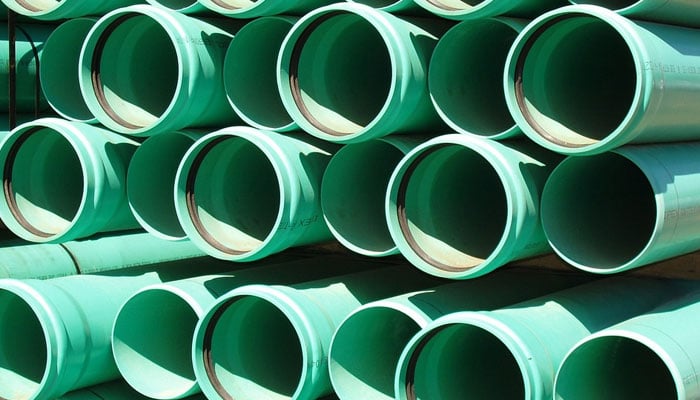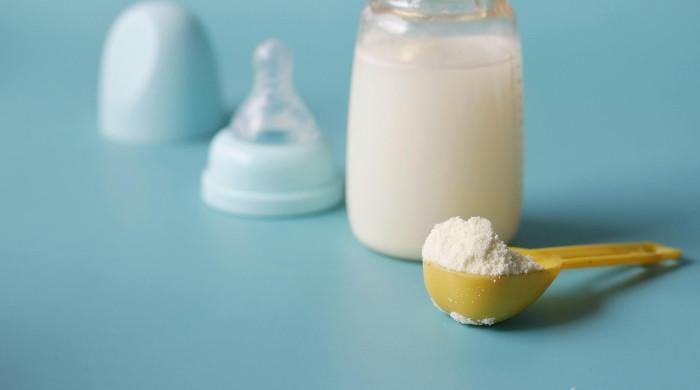PVC pipes risk human health: report
There is high demand for PVC pipes in sanitation and drinking water, according to industry trend reports
April 21, 2023

US environmental advocacy groups have warned in a report about the risks PVC plastic could pose to human health. They also suggested officials refrain from using such plastic for drinking water.
Despite its harmfulness, it has a very low cost and is a viable option for communities for drinking water.
To replace hazardous lead service pipelines, the Biden administration in 2021 had allocated a sum of $15 billion through US Environmental Protection Agency's (EPA) Drinking Water State Revolving Fund for communities coast to coast.
The report also criticised EPA for not issuing guidelines about what kind of pipelines should be used in such projects.
Judith Enck, a former regional EPA administrator and the president of Beyond Plastics, a nonprofit environmental group based at Bennington College, Vermont said: "In the months and years ahead, this new federal money will be flowing to state and local governments, and it's unfortunate the EPA is not providing any guidance on what is a safe substitute for lead service line pipes."
The report was released by Beyond Plastics with two other nonprofit environmental groups named Environmental Health Sciences and the Plastic Pollution Coalition.
EPA spokeswoman Dominique Joseph confirmed the agency has no requirements for plumbing materials except that they are lead-free.
Joseph was of the view that the EPA "supports independent, third-party testing standards for plumbing materials under NSF/ANSI [National Sanitation Foundation/American National Standards Institute] 61, which has been incorporated into many state and local plumbing codes."
"The report raises legitimate concerns about the health consequences from chemicals in PVC pipes leaching into the drinking water. Instead of PVC or CPVC – chlorinated polyvinyl chloride –, communities should use safer alternatives like stainless steel or copper even if those materials cost more," Enck said.
She maintained while speaking at the news conference that "When people say that plastics are cheap, they are dead wrong. The price is paid widely and for decades through health care costs and tax dollars."
The use of vinyl chloride was banned in 1974 in aerosols by Consumer Product Safety Commission banned the use of vinyl chloride in aerosols in 1974. However, it is being used in several products mainly in PVC pipes.
There is a high demand for PVC pipes in sanitation and drinking water, according to several industry trend reports.
According to a survey by a marketing research company, PVC was cited as the preferred material for water infrastructure projects of more than 200 contractors, engineers and municipal officials by Accountability Information Management.
Troy's deputy director of public information, Frank Sainato, said for its lead service line replacement project, the city of Troy, New York, opted for copper.
"We only use copper, because copper is tried and true. It may cost more, but public safety is always worth the extra expense," he noted.
In addition to the health risks, the report stated that environmental and health consequences are involved in the production of vinyl chloride.
Mike Schade, a program director of the environmental health research and advocacy organisation Toxic-Free Future, during an online press conference that the East Palestine train derailment is emblematic of that risk.
Since the derailment of vinyl chloride on February 3, people of East Palestine have reported health complications such as headaches, sore throats, eye irritation and coughing.
Schade said: "People who live near facilities involved in the production of vinyl chloride face those risks and more. These communities are disproportionately low-income and minority."
"It is deeply troubling that more than 10 billion pounds of vinyl chloride are produced in a year, and low-income communities and communities of colour are bearing the brunt of these harmful exposures," Shade added.
Shade also highlighted: "We all know that lead is toxic, but so is PVC pipe, which is known as the poison plastic. If EPA is truly committed to environmental justice, they would ban local and state governments from using PVC pipe to replace lead service lines."











